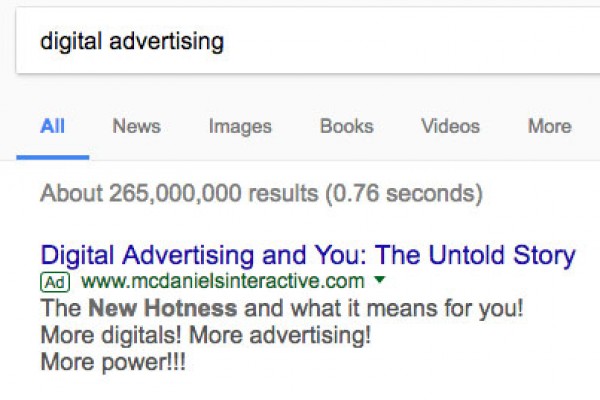

If you’re a business owner, marketing manager or business professional, then you know that digital advertising is no longer optional if you’re trying to reach consumers. From smartphones to tablets and streaming video sites, digital has become THE cost-effective means to reach potential clients. Yet, as essential as it is, the details of a digital campaign still remain murky for many advertisers. This is why many businesses rely on digital agencies for guidance. Here are four points that you should keep in mind when crafting a campaign with your advertising partners:
When devising any sort of plan, it’s always important to know your final objective. When developing an advertising campaign, you need to know who you’re trying to reach. Who is your ideal new customer? What do they look like in a demographic sense? Where are they located? What makes them tick?
The reason that this is important is one of the key advantages of digital advertising: targeting. At the bare minimum, digital campaigns can be targeted by age, gender and location. In the age of social media and Google accounts on smartphones, targeting can go deeper—much deeper. A reliable agency will help their clients navigate the sea of demographics available to help focus an ad so that it is delivered only to the individuals who are most likely to interact with it. After all, you wouldn’t serve ads for a 70" UHD-TV to the Amish community, right? Instead, wouldn’t it be better to target those ads to individuals with disposable income who’ve shown interest in electronics? Even better—wouldn’t it be ideal to serve those same ads only to individuals who’ve shown interest in a particular brand?
Digital advertising can be laser-focused, but only if you take the time to form a battle plan. Speaking of laser-focused…
“Talk is cheap. Action is everything.” This adage is especially true for PPC campaigns. There are a lot of firms that promote digital campaigns based solely on the number of impressions (ad views) that the campaign will deliver. That’s all well and good if you’re only interested in general brand awareness, but wouldn’t you rather only have to pay when someone actually interacts with your ad in a meaningful fashion?
This is why the notion of pay-per-click (PPC) is so important. Ad views are free; advertisers are only billed when a potential client clicks on the ad and is directed to a campaign specific landing page. Impression-based campaigns charge every time the ad appears on a consumer’s viewable screen—but they don’t guarantee that anyone actually pays attention to your ad. Your budget will go much, much farther if it’s only being spent for actions, not words. The action that you’re paying for is driving traffic to your website, which brings us to the next point.
Have you ever gone on vacation, pulled up to the motel and suddenly discovered that it doesn’t look as advertised? The pictures made it look quaint and rustic when the reality is that you’ve just arrived at the Bates Motel? The same thing applies to your PPC campaigns. Think about this—you spend all the time to define your audience, develop killer creative, optimize your program and yet the ads send potential customers to a landing page that is “less than good.” Even worse, the landing page doesn’t match the focus of the ad!
Your ads are the invitation and when consumers have clicked on that ad, it shows that they’re interested in your products and services. You want to keep that momentum going—so the ad’s destination URL needs to be inviting informative. It also needs to offer some way for that consumer to convert. We refer to this as the “path to conversion”—and it’s the crucial step in helping transition an individual from “interested party” to “future customer/client.”
Landing page content should align closely with the subject of the ad. Using the earlier TV example, the ad for a 70" UHD-TV should lead to a page showcasing a selection of UHD TVs. An ad for physical therapy services should take surfers to a physical therapy page, etc. The last thing you want to do is run an ad on a very specific topic and direct viewers to an incredibly general page. If they have to hunt for the information featured in the ad, the odds are that they’re just going to hit that dreaded “back” button and leave, unlikely to return.
Everyone knows what CPC is, right? HA!
CPC is defined in the digital world as “cost-per-click.” Essentially, it’s calculated by dividing the total budget for an ad campaign by the number of clicks generated during that period. What this really measures is how far your budget will go before it is used up. It’s also where many digital agencies insert management costs and other mark-ups. While this price structure is perfectly fine, it doesn’t really make the best use of a client’s budget. A transparent agency won’t add anything to the CPC—opting instead to charge an upfront monthly management fee. This way the “click budget” of the campaign is going to do just that—CLICK! Isn’t that the goal of a pay-per-click campaign in the first place?
Be mindful of the CPC for your campaigns. The lower this number is, the more reach your budget has—allowing you to put your products and services in front of more future customers.
These four points just scratch the surface of the complex nature of digital advertising. Yet, being aware of these factors can help advertisers to make more informed decisions when it comes to everything from placement to choice of digital ad agency. As with any kind of advertising, it’s always best to approach any potential campaign development with “eyes wide open.” Having a basic understanding of some of the core terminology can help your company or organization make informed decisions when setting up campaigns and entertaining recommendations from agencies courting your business.
